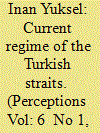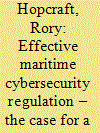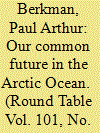| Srl | Item |
| 1 |
ID:
115903


|
|
|
|
|
| Publication |
2013.
|
| Summary/Abstract |
The Arctic ice is melting faster than predicted. In August 2012, calculations based on the satellite imagery indicated that the summer sea ice loss was 50 per cent higher than earlier estimates. 1 Scientific evidence now suggests that the Arctic, by the middle of the century, will be ice free in the summer. Scientists call it the 'Arctic amplification'-the reduction in the ice cover not only reduces the reflection of the sunlight but also increases the absorption of heat as the darker water is exposed.
|
|
|
|
|
|
|
|
|
|
|
|
|
|
|
|
| 2 |
ID:
018851


|
|
|
|
|
| Publication |
March-May 2001.
|
| Description |
99-116
|
|
|
|
|
|
|
|
|
|
|
|
|
|
|
|
| 3 |
ID:
161466


|
|
|
|
|
| Summary/Abstract |
Ships and ports are increasingly connected to each other through cyberspace. This connectivity streamlines many aspects of maritime business, but also exposes maritime operators and administrations to new types of risk including hacking and outage. The maritime industry has been slow to realize the implications of this new environment within which it operates, and now lags behind other industries (like aviation) when it comes to cyber risk mitigation and regulation. We argue that the International Maritime Organisation (IMO), alongside its members, urgently needs to create robust and resilient cybersecurity regulations. We suggest that the IMO should consider creating a standalone Cyber Code, based on a framework created by previous IMO Codes such as the Polar Code. Since the IMO uses Codes as a legally binding instrument, this would help to ensure the continued safety and efficiency of the maritime industry in the face of threats from cyberspace.
|
|
|
|
|
|
|
|
|
|
|
|
|
|
|
|
| 4 |
ID:
112473


|
|
|
|
|
| Publication |
2012.
|
| Summary/Abstract |
Environmental state-change in the Arctic Ocean is introducing risks of political, economic and cultural instability. Interests are awakening to take advantage of new energy, shipping, fishing and tourism opportunities associated with the diminishing sea-ice. With urgency-building on the common arctic issues of sustainable development and environmental protection-environmental security offers an holistic context to address the risks and opportunities within law of the sea, as the international legal framework to preserve peace and stability in the Arctic Ocean.
|
|
|
|
|
|
|
|
|
|
|
|
|
|
|
|